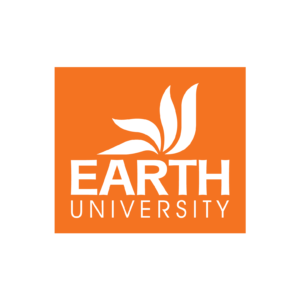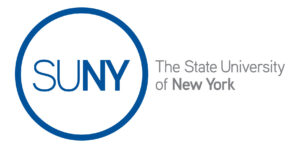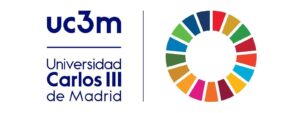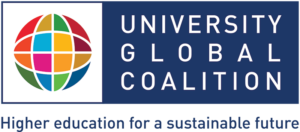The 2023 UGC Annual Gathering will take place virtually 2-6 October 2023 in the form of a global 17 Rooms.
Below:
-
Gathering Overview
-
Timeline
-
Gathering Schedule Overview (Full schedule page available here)
2023 Gathering Overview:
Would you like to:
+ Help drive community action on a range of issues using the world’s Sustainable Development Goals (SDGs) as a common language?
+ Bring together a cross-section of like-minded people engaged in concrete actions to spot connections and opportunities for progress across efforts?
+ Be part of a global network of leaders innovating new ways to generate action, share insight, and foster community for people and planet?
University Global Coalition (UGC) will devote its 2023 Annual Conference (virtual) to furthering plans and actions from universities around the world to support the 17 Sustainable Development Goals, utilizing the 17 Rooms process developed by the Brookings Institution and The Rockefeller Foundation.
Join one of the 17 action-focused working groups (or “Rooms”) during the week of 2 October 2023. During this week, Rooms will meet for a guided discussion focused on a particular SDG, during which they will determine one tangible action or outcome of their collaboration (such as a white paper, webinar, or development of a resource) that can be accomplished by Sustainable Development Goals Action & Awareness Week 2024 (4-8 March 2024). Inspirational keynote sessions will open and close the Annual Gathering, and a report out from all groups will close our time together.
Factors including the Room size, composition, external partners, and specific focuses within the selected SDG will be based upon responses to the Call for Participation.
Note that all meetings for the 2023 Annual Gathering 17 Rooms-UGC will be virtual.
Participant commitment
Room participants’ total time commitment between September 2023-March 2024 is approximately 5 hours/participant. This time includes: a small amount of pre-work/reading in September, participating in the 17 Rooms process in October, and follow-up collaboration with your Room to make significant progress towards your stated objective by March 2024.
You must complete the Call for Participation form by 27 September 2023 to receive links to join rooms as a participant.
Important Dates/Timeline for participants (dates subject to change):
May 2023: Call for Participation Open
September 28, 2023: Call for Participation Closes (all intended participants in rooms must complete this form)
July-August: Room organization
September: Moderator training
October 2-6, 2023: Annual Gathering/17 Rooms
November: 17 Rooms report complete
March 4-8, 2024 : Rooms share updates/results of their shared action during UGC’s SDG Action & Awareness Week
(As desired): Rooms continue as SDG working groups
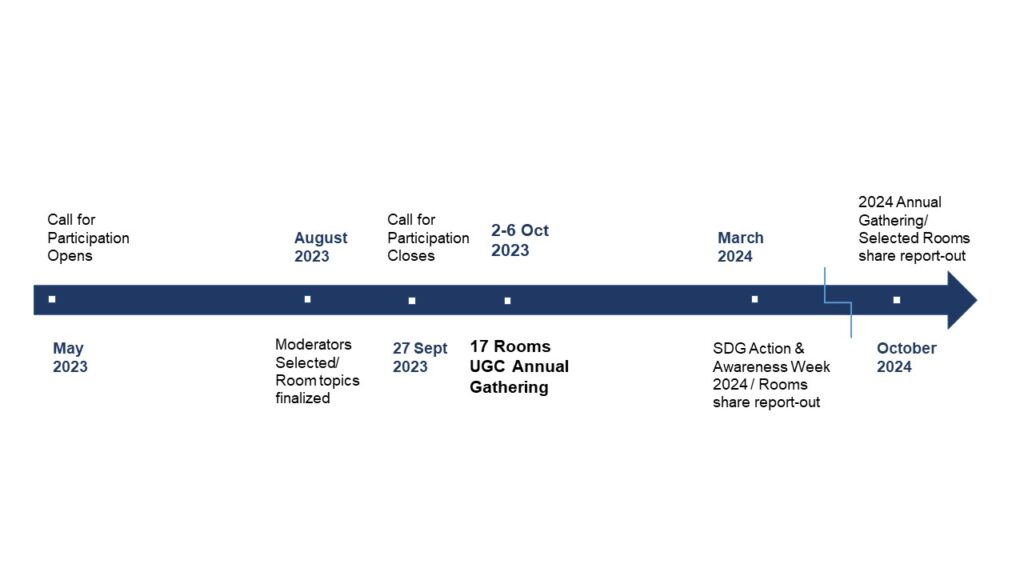
2023 17 Rooms Schedule
The confirmed room times for 17 Rooms are below! Room dates and times will be added below as confirmed. Note that some SDGs have multiple rooms focused on them due to strong participant interest. Rooms are facilitated in English unless otherwise stated.
The full schedule page with moderator and speaker biographies, full session descriptions, and Zoom links to join rooms is available here.
Zoom links for rooms will be sent directly to those who registered for the Call for Participation. The Call is open through 28 September on the Call for Participation page.
Monday 2 October: 9:30-10:45 AM EDT (New York)
17 Rooms Opening Session featuring the Brookings Institution and winners of the SDG2: Zero Hunger International Student Challenge
Speakers include: Arturo Condo, President, EARTH University and Vice-Chair, University Global Coalition; John W. Arthur, Director -Center for Sustainable Development, the Brookings Institution; Meryem Talbo, PhD candidate and SDG2 student challenge winner, McGill University; Davrina Rianda, PhD candidate and SDG2 student challenge winner; Ángel Cabrera, President, Georgia Institute of Technology and Chair, University Global Coalition
Monday 2 October: 11.00-13.00 EDT (New York)/ 15.00-17.00 GMT
Room 4: Educación de calidad (en español): Moderated by: Heidy Diaz, Universidad Veracruzana; María Esther Carmona Guzmán, Universidad Veracruzana
Room 4/10: Quality Education/Reduced Inequalities (special focus: Equitable Classrooms): Promoting Equitable Classroom Environments Moderated by: Kali Trzesniewski, University of California, Davis; Mequanint Birhan Alem, Mizan Tepi University
Room 4: Quality Education (special focus: Education for Sustainable Development): Embedding and Mainstreaming Education for Sustainable Development in Curriculum; Moderated by Akash Mishra, Newcastle University and Scott Strachan, University of Strathclyde
Room 13: Climate Action: Exploring Best Practices in Addressing Climate Risks in a University Context Moderated by: Juan Archila, Georgia Institute of Technology, Martín Carlos Sánchez Gutiérrez, Tecnológico de Monterrey, Krista Houser, McGill University
Room 14/15: Life below Water/Life on Land: Youth Drivers for Biodiversity Conservation; Moderated by Sogbohossou Etotepe, Senghor University; Aishat Oduye, Babock University
Room 17: Partnerships for the Goals: Academia-Industry-Government Partnership for Sustainable Innovation and Social Impact Moderated by: Dr. Yetunde Omede, Farmingdale State University
Tuesday 3 October from 7.00-9.00 EDT/ 11.00-13.00 GMT/ 19.00-21.00 CST (Beijing)
Room 11: Sustainable Cities and Communities: Community Engagement for Climate Action: Grassroots Initiatives; Moderated by: Mane Umaru, Undergraduate Student, Gombe State University; Sean Schrader, Graduate Student, University of South Florida
Room 16: Peace, Justice, and Strong Institutions: Global Partnership for Peace Building; Moderated by: Sudha Pyakurel, Kathmandu School of Law; Juliet Atieno Bwoga, Law Student, University of Nairobi
Tuesday 3 October from 10.00-12.00 EDT/ 14.00-16.00 GMT
Room 1: No Poverty: Innovative Approaches to Alleviating Poverty in East Africa; Moderated by: Kaijamahe Walter Hillary, Makerere University; Loreen Chebet, University of Nairobi
Room 2: Zero Hunger: Holistic Approaches for Alleviating Hunger at the Household Level Moderated by: Sophie Javers, University of California Davis; Ifeoluwa Bodunde, Lead City University
Room 4: Quality Education: Resources with Academia for Including the SDGs Moderated by: Dr Aliar Hossain, Northumbria University London Campus; Natalie Coers, University of Florida; Esther Egede, Ahmadu Bello University
Room 8: Decent Work and Economic Growth: Enhancing Trade Opportunities for Youth-Owned Enterprises Through Skills Training and Access to Start-Up Funding; Moderated by: Smith Vitumbiko, Alagappa University; Halimatu Iddrisu, Kwame Nkrumah University of Science and Technology
Room 16: Paz, justicia e instituciones sólidas (en español); Moderated by: Ángel González, Universidad Carlos III de Madrid
Wednesday 4 October 7.00-9.00 EDT/ 11.00-13.00 GMT/ 19.00-21.00 CST (Beijing)
Room 10/4: Reduced Inequalities/Quality Education: Exploring access to education for people with disabilities in developing countries (SDGs 4 and 10): Moderated by: Oladipupo Oluwaseyi Samson, Graduate Student, University of Ibadan; Siyu (Suzanna) Chen, Undergraduate Student, University College London
Thursday 5 October 7.00-9.00 EDT/ 11.00-13.00 GMT/19.00-21.00 CST (Beijing)
Room 5/4: Gender Equity/Quality Education: Empowering girl’s education as part of community development; Moderated by Bright Emmanson, Nnamdi Azikiwe University; Beauty Uzochi Ukazu, Ignatius Ajuru University of Education; Kamila Ciok, University of Geneva; Aleezay Khaliq, George Mason University
Room 9: Industry, Innovation, and Infrastructure: Promoting Modern Technology to Support Inclusive and Sustainable Industrialization and Poverty Reduction; Moderated by God’sfavour Idowu-Agida, University of Ibadan; Wanlin Bai, Duke Kunshan University
Thursday 5 October 9.00-11.00 EDT/ 13.00-15.00 GMT
Room 7: Affordable and Clean Energy; Moderated by Purvi Parek, Somaiya Vidhya Vihar University
Thursday 5 October 11.00-13.00 EDT/ 15.00-17.00 GMT
Room 6/3: Clean Water and Sanitation/Good Health and Well Being: Sustainable Development Goal 6: A Catalyze for Accelerating the Implementation of the SDGs and the 2030 Agenda and Promoting Sustainable Development for All; Moderated by: Joyce Kyerewaa Ahenkorah, University for Development Studies; Edwin Boakai, Cepres International University; Luis Gillen, EARTH University
Friday 6 October: 10:00-11:00 AM EDT (New York)
17 Rooms Closing Session
Speakers, Jacob Taylor, Fellow-Global Economy and Development, Center for Sustainable Development, the Brookings Institution; Shannon Yee, Associate Professor, Georgia Institute of Technology
A special thank you to the 2023 UGC conference planning committee:
Arturo Condo, President, EARTH University (Committee Chair)
Sally Crimmins Villela, Associate Vice Chancellor for Global Affairs, State University of New York
Drew Cutright, Managing Strategy Consultant, Georgia Institute of Technology
Gbemi Disu, Vice President for Global Network Expansion, Northeastern University
Silvia Gallart Parramon, Directora, Undidad de Relaciones Institucionales y Desarrollo Sostenible, Universidad Carlos III de Madrid
Luis Gillen, Professor, EARTH University
Samuel Karanja, Senior Strategy Consultant, Georgia Institute of Technology
Joanna Regulska, Vice Provost and Dean – Global Affairs, Professor of Gender, Sexuality and Women’s Studies, University of California, Davis
Paola Visconti Arizpe, Líder de Vinculación Estratégica, Tecnológico de Monterrey
 Recordings from the 2022 and 2021 Gatherings
Recordings from the 2022 and 2021 Gatherings
Visit our Videos page to watch recordings from past gatherings!
2022 Conference Report
View a summary of conference proceedings and information on attendees and impact in the UGC Annual Conference 2022 Report.
2021 Conference Report
View a summary of conference proceedings and information on attendees and impact in the UGC Annual Conference 2021 Report.
Support Provided by:

